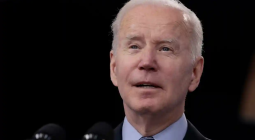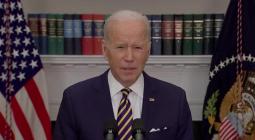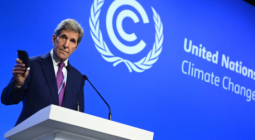Public lands to reopen for oil and gas drilling in a first under Biden
As federal officials weigh efforts to fight the climate crisis against pressure to bring down high gasoline prices, the interior department is moving forward with the first onshore sales of public oil and natural gas drilling leases under Joe Biden.
The move also calls for a sharp increase in royalty rates for companies, ostensibly to limit global emissions driving the climate crisis, though economists say the effect will be relatively small.
The royalty rate for new leases will increase to 18.75% from 12.5%. That’s a 50% jump and marks the first increase to royalties for the federal government since they were imposed in the 1920s.
Biden suspended new leasing just a week after taking office in January 2021. A federal judge in Louisiana ordered the sales to resume, saying interior officials had offered no “rational explanation” for canceling them.
The government held an offshore lease auction in the Gulf of Mexico in November, although a court later blocked that sale before the leases were issued.
Friday’s announcement comes as Biden faces pressure to expand US crude production after the pandemic and war in Ukraine have caused a surge in fuel prices and otherwise generally roiled the world economy.
Last month, the Democratic president announced plans to release 1m barrels daily from the US strategic oil reserves to, as he put it, “ease the pain families are feeling right now” at the country’s fuel pumps because of Russian president Vladimir Putin’s decision to invade Ukraine.
Yet Biden also faces calls from within his own party to do more to curb emissions from fossil fuels that are driving the climate crisis.
Leases for 225 sq miles (580 sq kilometers) of federal lands primarily in the western US will be offered for sale in a notice to be posted on Monday, officials said. The parcels represent about 30% less land than officials had proposed for sale in November and 80% less than what was originally nominated by the industry.
The sales notices will cover leasing decisions in nine states: Wyoming, Colorado, Utah, New Mexico, Montana, Alabama, Nevada, North Dakota and Oklahoma.
Interior department officials declined to specify which states would have parcels for sale or to give a breakdown of the amount of land by state, saying that information would be included in Monday’s sales notices. They said the reduced area being offered reflects a focus on leasing in locations near existing oil and gas development including pipelines.
Hundreds of parcels of public land that companies nominated for leasing had been previously dropped from the upcoming lease sale because of concerns about wildlife being harmed by drilling rigs.
At the time, officials said burning fuel from the remaining leases could cost billions of dollars in climate crisis impacts. Fossil fuels extracted from public lands account for about 20% of energy-related US greenhouse gas emissions, making them a prime target for climate activists who want to shut down leasing.
Republicans want more drilling, saying it would increase US energy independence and help bring down the cost of crude. But oil companies have been hesitant to expand drilling because of uncertainty over how long high prices will continue.
Friday’s announcement comes after interior officials had raised the prospect of higher royalty rates and less land available for drilling in a leasing reform report issued last year.
“For too long, the federal oil and gas leasing programs have prioritized the wants of extractive industries,” said the interior secretary, Deb Haaland. “Today, we begin to reset how and what we consider to be the highest and best use of Americans’ resources.”
But the move brought condemnation from both ends of the political spectrum: Environmentalists derided the decision to hold the long-delayed sales, while oil industry representatives said the higher royalty rates would deter drilling.
Nicole Ghio with the environmental group Friends of the Earth said Biden was “auctioning off our public lands to big oil”, putting oil industry profits ahead of future generations that will have to deal with the worsening consequences of the climate crisis.
Meanwhile, the American Petroleum Institute vice-president Frank Macchiarola said officials removed some of the most significant parcels that companies wanted to drill while adding “new barriers” that would discourage companies from investing in drilling on public lands.
Lease sales and royalties that companies pay on extracted oil and gas brought in more than $83bn in revenue over the past decade. Half the money from onshore drilling goes to the state where it occurred.
Most states and many private landowners require companies to pay royalty rates higher than 12.5%, with some states charging 20% or more, according to federal officials.
The royalty rate for oil produced from federal reserves in deep waters in the Gulf of Mexico is 18.75%. In the November auction that was later canceled, energy companies including Shell, BP, Chevron and ExxonMobil offered a combined $192m for offshore drilling rights in the Gulf.
New leases that are developed could keep producing crude long past 2030, when Biden has set a goal to lower greenhouse gas emissions by at least 50%, compared with 2005 levels. Scientists say the world needs to be well on the way to that goal over the next decade to avoid catastrophic climate crisis.
Economists say a higher royalty rate would have a relatively small effect on global emissions, because any reductions in oil and gas from federal lands would be largely offset by fuel from other sources.
Photograph: Larry W Smith/EPA





